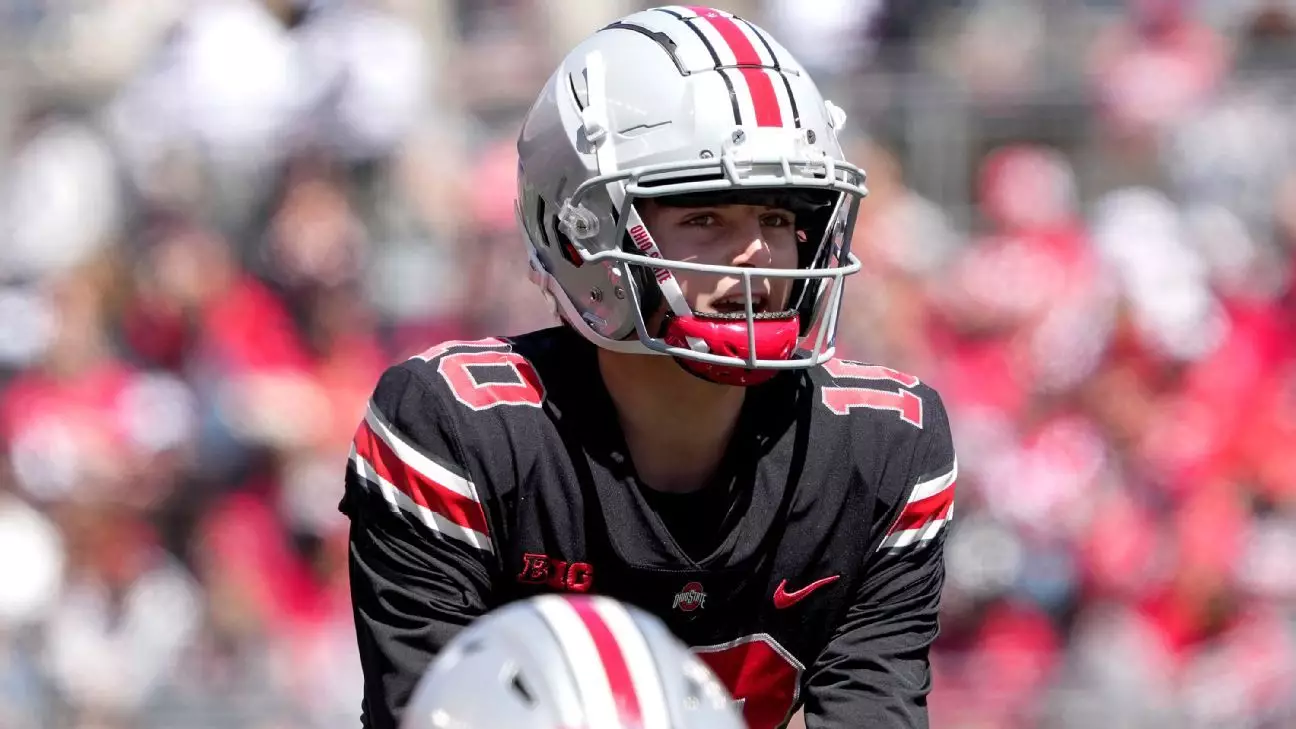In the volatile landscape of college football, decisions about starting quarterbacks are often painted as purely meritocratic, yet beneath this veneer lies a complex web of coaching biases, player development stages, and psychological warfare. Ohio State’s recent announcement of Julian Sayin as the starter for their season opener reveals more about the flawed emphasis on “consistency” than genuine leadership capability. While Coach Ryan Day praises Sayin’s recent performance, this focus on consistency ignores the underlying issues that make the “best player for the team” a highly subjective judgment. What does it truly mean to be consistent? Is it a measure of talent, mental resilience, or the coaching staff’s comfort zone? In many cases, the discourse emphasizes surface-level metrics rather than the qualities that foster long-term success in high-pressure situations.
The temptation to label a player as “more consistent” often masks deeper flaws. It can lead to undervaluing raw talent or game-winning potential in favor of reliability that may not translate into genuine leadership. Both Sayin and Kienholz have shown flashes of promise, but reducing this battle to who “separated himself” last week diminishes the more nuanced discussion of future potential, readiness, and mental toughness. Programs often prefer the “safer” choice, the quarterback who appears to make fewer mistakes today, rather than the one who could ignite a revolution tomorrow.
Leadership or Comfort Zone? Rethinking Player Development
The choice to name Sayin as the starter also raises questions about how Ohio State views player development. Is the focus on immediate performance a strategy rooted in genuine growth, or merely a desire to secure wins early in the season? Pointing to Sayin’s upward trajectory, coach Day emphasizes his recent surge but neglects to scrutinize the long-term developmental potential of both quarterbacks. Talent alone isn’t enough; leadership extends beyond physical skill to psychological resilience and the ability to galvanize teammates under adverse circumstances.
By elevating Sayin now, Ohio State might be sacrificing the opportunity for Kienholz—or even a future superstar—to gain invaluable experience in high-stakes games. This “safe” pick risks curbing Kienholz’s development, effectively pigeonholing him as a backup rather than nurturing his potential to become a true game-changer. In a broader sense, this approach reflects a conservative mindset prevalent in college sports—a preference for short-term stability over long-term growth, which often erodes player confidence and stifles competitive spirit.
The Politics of Talent and the Illusion of Meritocracy
This quarterback decision underscores a broader dilemma within collegiate athletics: the myth of meritocracy. While rankings like Sayin’s No. 9 national recruit status are touted as evidence of superior talent, these labels can be misleading. Recruitment rankings are subjective and often fail to predict future performance accurately. Moreover, the transfer of Sayin from Alabama after Saban’s retirement hints at a mercurial nature of loyalty and stability within college programs. It suggests that talent, in isolation, often takes a backseat to political maneuvering within the coaching hierarchy.
Furthermore, coaching staff tend to favor players who can adapt quickly, especially when facing the formidable Texas Longhorns. Yet, this pragmatic approach undermines the value of patience and potential growth, ignoring that great quarterbacks are often molded through adversity and experience. The coaching staff’s somewhat dismissive tone toward Kienholz—assuring him he “knows he’ll play this year”—feigns confidence but perhaps masks uncertainty about his ability to lead a high-stakes team. The real challenge lies in fostering a culture where young players are not just competing for a starting spot but are prepared to assume leadership roles when called upon.
Ohio State’s decision encapsulates a wider societal tendency to favor quick results and immediate stability over the messy, unpredictable process of development. From a centrist liberal perspective, this scenario exposes the dangers of prioritizing superficial evidence of “readiness” at the expense of fostering genuine talent and leadership. College football, and sports in general, should serve as a microcosm for broader societal values—values that emphasize patience, integrity, and long-term growth rather than expedient performances.
The emphasis on consistency and immediate results at Ohio State highlights the fragility of the modern athletic ideal. It risks undervaluing qualities like resilience, adaptability, and the willingness to grow under pressure. As fans and observers, we should challenge the narrative that quick flashes of competence outweigh the importance of nurturing potential. In doing so, we advocate for a more honest and holistic approach to player development—one that recognizes the true essence of leadership is rooted in perseverance and the courage to evolve beyond one’s current form.


Leave a Reply